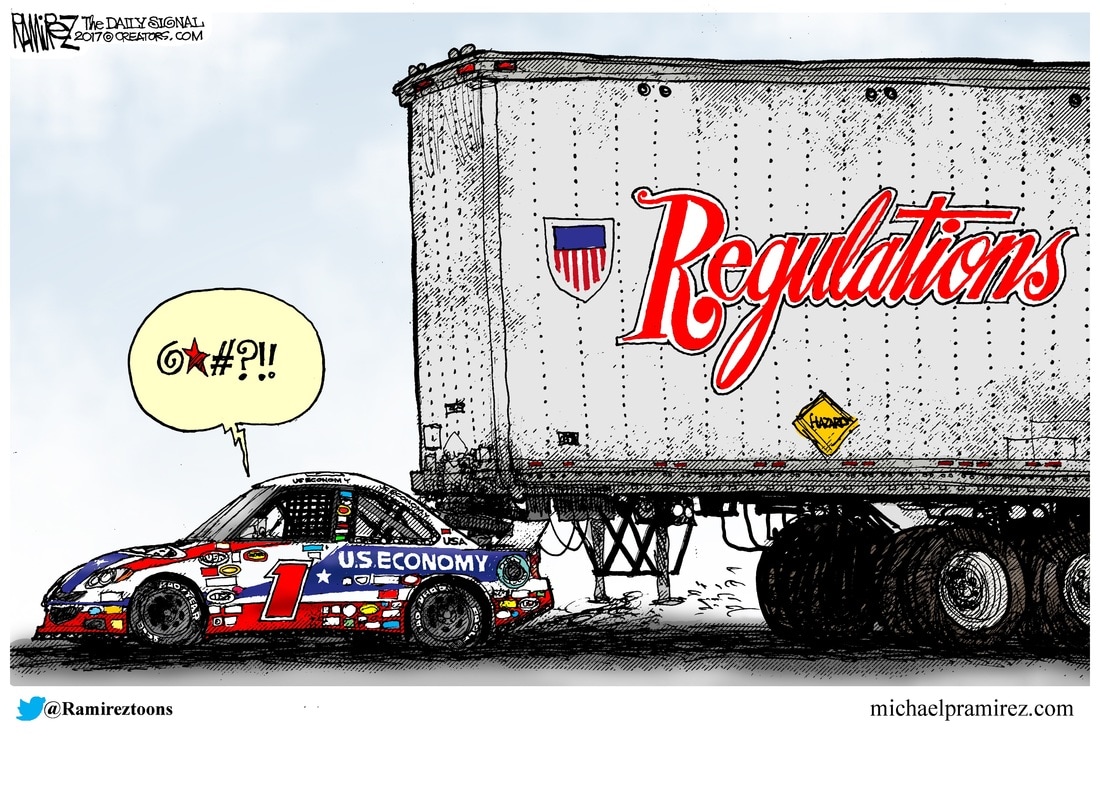Welcome to the World of Pulitzer Prize Winning Political Cartoonist Michael P. Ramirez
Exceeding the Weight Limit 04-29-17
Heavy regulatory semi trailer holds back race car economy
Dave Sussman April 29, 2017
Dave Sussman, a Fox Business contributor and small business advocate is CEO of Valcor, a business restructuring and consultant training firm.
Sixty seven percent of employed persons work for a small business, and for eight years small business has been under siege by policies created by politicians who have never once made payroll. For this economy to truly expand, for people to achieve their full economic potential, reversal of much of the thousands of unnecessary and job killing regulations must occur and soon.
Dave Sussman April 29, 2017
Dave Sussman, a Fox Business contributor and small business advocate is CEO of Valcor, a business restructuring and consultant training firm.
Sixty seven percent of employed persons work for a small business, and for eight years small business has been under siege by policies created by politicians who have never once made payroll. For this economy to truly expand, for people to achieve their full economic potential, reversal of much of the thousands of unnecessary and job killing regulations must occur and soon.
Downsizing the Regulatory State Will Upsize the American Economy
Celeste Arenas on Thursday, March 2nd, 2017 AMERICANS FOR TAX REFORM
A recent study by the Phoenix Center on the cost of regulation to the American economy suggests the Trump Administration’s 2 for 1 Executive Order is making positive steps towards accelerating private sector growth and employment.
They show that a 10% reduction of the record breaking 81, 405 pages of regulations implemented since 2008 under the Obama administration would result in:
“$5.6 billion in annual savings, producing an additional $1.2 trillion in GDP over the next five years, or $244 billion annually.”
“A $45 gain for every $1 decline in the regulatory budget.”
“An annual increase of 3 million new private-sector jobs.”
The analysis found an inverse relationship between the size of the regulatory budget and economic growth. It concluded that the opportunity cost of one regulator was the equivalent of 138 private sector jobs and the financial cost, an $11 million annual loss to the US economy.
The size and scope of the federal regulatory state has become so expansive that it can be counted as a nation in and of itself, ranked as the world’s 10th largest economy behind Russia and ahead of India. This illusory economy has of course, come at the expense of the regulated, most of which are small businesses and their employees disproportionately impacted by regulatory excess. Small businesses, with 20 employees or less, currently face an annual regulatory cost that is 36% higher than large firms with 500 employees or more.
These regulations, combined with the financial capacity of large businesses to afford high compliance costs, have distorted the marketplace for 27.9 million small businesses who employ more than 50% of the American workforce. Gallup has since revealed the record breaking decrease of small businesses in operation alongside the increase in the number of firms that have shut down since 2008.
In dismantling the capacity for small firms to thrive, the expanse of regulator power has strangled job opportunities for the American workforce as 65% of net employment from 1995 has been created by small businesses.
The statistics suggest rescinding two regulations for every new regulation enacted is the first of many steps necessary to address the systemic flaws of the regulatory state. Although outcome-based legislation is key to sustaining a smart regulatory framework, policy makers have been offered an ample opportunity to repeal excessive mandated requirements that are stifling entrepreneurial activity.
Instead of adding to a burdensome and lifeless regulatory economy, the careful down scale of federal departments and their budgets will accelerate the life of American innovation, private sector growth and opportunities for the workforce. read more
Celeste Arenas on Thursday, March 2nd, 2017 AMERICANS FOR TAX REFORM
A recent study by the Phoenix Center on the cost of regulation to the American economy suggests the Trump Administration’s 2 for 1 Executive Order is making positive steps towards accelerating private sector growth and employment.
They show that a 10% reduction of the record breaking 81, 405 pages of regulations implemented since 2008 under the Obama administration would result in:
“$5.6 billion in annual savings, producing an additional $1.2 trillion in GDP over the next five years, or $244 billion annually.”
“A $45 gain for every $1 decline in the regulatory budget.”
“An annual increase of 3 million new private-sector jobs.”
The analysis found an inverse relationship between the size of the regulatory budget and economic growth. It concluded that the opportunity cost of one regulator was the equivalent of 138 private sector jobs and the financial cost, an $11 million annual loss to the US economy.
The size and scope of the federal regulatory state has become so expansive that it can be counted as a nation in and of itself, ranked as the world’s 10th largest economy behind Russia and ahead of India. This illusory economy has of course, come at the expense of the regulated, most of which are small businesses and their employees disproportionately impacted by regulatory excess. Small businesses, with 20 employees or less, currently face an annual regulatory cost that is 36% higher than large firms with 500 employees or more.
These regulations, combined with the financial capacity of large businesses to afford high compliance costs, have distorted the marketplace for 27.9 million small businesses who employ more than 50% of the American workforce. Gallup has since revealed the record breaking decrease of small businesses in operation alongside the increase in the number of firms that have shut down since 2008.
In dismantling the capacity for small firms to thrive, the expanse of regulator power has strangled job opportunities for the American workforce as 65% of net employment from 1995 has been created by small businesses.
The statistics suggest rescinding two regulations for every new regulation enacted is the first of many steps necessary to address the systemic flaws of the regulatory state. Although outcome-based legislation is key to sustaining a smart regulatory framework, policy makers have been offered an ample opportunity to repeal excessive mandated requirements that are stifling entrepreneurial activity.
Instead of adding to a burdensome and lifeless regulatory economy, the careful down scale of federal departments and their budgets will accelerate the life of American innovation, private sector growth and opportunities for the workforce. read more


